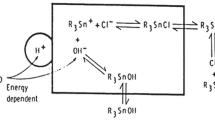Summary
The present study deals with the influence of some bis(η5-cyclopentadienly)titanium(IV) (titanocene) complexes, mainly represented by titanocene dichloride, on the development of several human gastrointestinal (GI) carcinomas (one stomach, seven colon, four sigmoid, and two rectal adenocarcinomas), all xenografted to athymic mice. In 10 of these 14 carcinomas, titanocene dichloride effected growth suppression of >50% in comparison with control tumors. In the case of the stomach and two colon adenocarcinomas, absolute decreases in tumor volume occurred during and after the treatment period, resulting in growth delays of 6, 14, and 31 days, respectively. No sensitivity dependence was observed in the degree of tumor differentiation. The findings of the present study confirm the tumor-inhibiting activity of titanocene complexes against human GI adenocarcinomas. These results are noteworthy in view of previous clinical and experimental experience indicating that human adenocarcinomas of the stomach and colon are generally rather insensitive to common cytostatic agents.
Similar content being viewed by others
References
Bastert GB, Fortmeyer HP, Schmidt-Matthiesen H (1981) Thymus aplastic nude mice and rats in clinical oncology. Gustav Fischer Verlag, Stuttgart, New York
Bellet RE, Danna V, Mastrangelo MJ, Berd D (1979) Evaluation of a “nude” mouse-human tumor panel as a predicitive secondary screen for cancer chemotherapeutic agents. J Natl Cancer Inst 63:1185–1188
Biran S, Biran H (1981) Mitomycin-C combinations in the treatment of advanced gastrointestinal carcinoma. In: Mitomycin-C in clinical oncology. Kyowa Hakko Kogyo, Co. Ltd., Tokyo, pp 19–26
Döppert K, Sanchez-Delgado R, Klein HP, Thewalt U (1982) Darstellung, Struktur und Eigenschaften von Bis(cyclopentadienyl)oxalatotitan(IV) und Bis(cyclopentadienyl)bis(hydrogenmaleinato)titan(IV). J Organomet Chem 233:205–213
Fiebig HH, Löhr GW (1984) Wachstum menschlicher Malignome und Entwicklung von tumormodellen in der thymusaplastischen Nacktmaus. Beitr Onkol 18:287–314
Fiebig HH, Schuchhardt C, Heuss H, Fiedler L, Löhr GW (1984) Comparison of tumor response in nude mice and in patients. Behring Inst Mitt 74:343–352
Köpf-Maier P (1987) Tumor inhibition by titanocene complexes: influence upon xenografted human lung carcinomas. J Cancer Res Clin Oncol 113:342–348
Köpf-Maier P (1988) Histologic and ultrastructural alterations of a xenografted human colon adenocarcinoma after treatment with titanocene dichloride. J Cancer Res Clin Oncol 114:250–258
Köpf-Maier P, Köpf H (1987) Tumor inhibition by titanocene complexes: activity against B16 melanoma and colon 38 carcinoma. Drug Res/Arzneim-Forsch 37:532–534
Köpf-Maier P, Köpf H (1987) Non-platinum-group metal antitumor agents: history, current status and perspectives. Chem Rev 87:1137–1152
Köpf-Maier P, Hesse B, Voigtländer R, Köpf H (1980) Tumor inhibition by metallocenes: antitumor activity of titanocene dihalides (C5H5)2TiX2 (X=F, Cl, Br, I, NCS) and their application in buffered solutions as a method for suppressing drug-induced side effects. J Cancer Res Clin Oncol 97:31–39
Köpf-Maier P, Wagner W, Hesse B, Köpf H (1981) Tumor inhibition by metallocenes: activity against leukemias and detection of the systemic effect. Eur J Cancer 17:665–669
Köpf-Maier P, Moormann A, Köpf H (1985) Activity of titanocene dihalides against a human colon carcinoma heterotransplanted to athymic mice. Eur J Cancer Clin Oncol 21: 853–857
Köpf-Maier P, Grabowski S, Liegener J, Köpf H (1985) New antitumor titanocene derivatives containing hydrophilic ligands. Inorg Chim Acta 108:99–103
Köpf-Maier P, Preiß F, Marx T, Klapötke T, Köpf H (1986) Tumor inhibition by titanocene complexes: activity against sarcoma 180. Anticancer Res 6:33–38
Moertel CG (1975) Clinical management of advanced gastrointestinal cancer. Cancer 36:675–682
Nowak K, Peckham MJ, Steel GG (1978) Variation in response of xenografts of colo-rectal carcinoma to chemotherapy. Br J Cancer 37:576–584
Osieka R, Houchens DP, Goldin A, Johnson RK (1977) Chemotherapy of human colon cancer xenografts in athymic nude mice. Cancer 40:2640–2650
Povlsen CO, Rygaard J (1971) Heterotransplantation of human adenocarcinomas of the colon and rectum to the mouse mutant nude. A study of nine consecutive transplantations. Acta Pathol Microbiol Scand A 79:159–169
Rygaard J, Povlsen CO (1982) Athymic (nude) mice. In: Foster HL (eds.) The mouse in biomedical research, vol IV. Academic Press, New York, pp 51–67
Samuel E (1966) Les complexes-π des métaux de la colonne IV A avec le cyclopentadiène, l'indène et le fluorène. Bull Soc Chim Belg: 3548–3564
Shorthouse AJ, Smyth JF, Steel GG, Ellison M, Mills J, Peckham MJ (1980) The human tumour xenograft—a valid model in experimental chemotherapy? Br J Surg 67:715–722
Wilkinson G, Birmingham JM (1954) bis-Cyclopentadienyl compounds of Ti, Zr, V, Nb, and Ta. J Am Chem Soc 76: 4281–4284
Wolpert-DeFilippes MK (1979) Antitumor activity of cis-dichlorodiammineplatinum(II). Cancer Treat Rep 63: 1453–1458
Author information
Authors and Affiliations
Rights and permissions
About this article
Cite this article
Köpf-Maier, P. Tumor inhibition by titanocene complexes: influence on xenografted human adenocarcinomas of the gastrointestinal tract. Cancer Chemother. Pharmacol. 23, 225–230 (1989). https://doi.org/10.1007/BF00451646
Received:
Accepted:
Issue Date:
DOI: https://doi.org/10.1007/BF00451646




